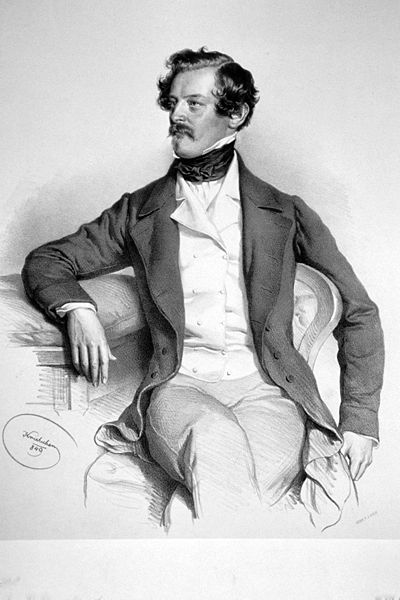<Back to Index>
- Inventor Louis Braille, 1809
- Sculptor Wilhelm Lehmbruck, 1881
- Minister of the Interior Baron Alexander von Bach, 1813
PAGE SPONSOR

Baron Alexander von Bach (4 January 1813, Loosdorf, Austria - 12 November 1893, Schöngrabern, Austria) was an Austrian politician. His most notable achievement was instituting a system of centralised control at the beginning of the reign of Emperor Franz Joseph I of Austria.
He served as Minister of Justice in 1848 and 1849 and then Minister of the Interior from 1849 to 1859. A well known liberal lawyer, he was first called a "minister of barricades". However, he gradually accepted conservative views, endorsing the centralizing constitutional program of Prince Schwarzenberg in March 1849 and thus further inflaming Hungarian sentiments.
After the death of Schwarzenberg in 1852, he largely dictated policy in Austria and Hungary. Bach centralised administrative authority for the Austrian Empire, but he also endorsed reactionary policies that reduced freedom of the press and abandoned public trials. He represented later the Absolutist (or Klerikalabsolutist) direction, which culminated in the concordat of August 1855 that gave the Roman Catholic Church control over education and family life.
On the other hand the economic freedom rose greatly in 1850s. The internal customs duties were abolished.
Bach was created Baron (Freiherr) in 1854. He was also the guardian of Science Academy (Akademie der Wissenschaften) in 1849 - 1859.
Prisons were full of political prisoners; during his administration, Czech nationalist Karel Havlíček Borovský was expatriated to Brixen (1851 - 1855).
The pillars of so-called Bach system (Bachsches System) were, in the words of Adolf Fischhof, four "armies": a standing army of soldiers, a sitting army of office holders, a kneeling army of priests and a fawning army of sneaks.
His fall in 1859 was highly caused by the failure in Italian war against Kingdom of Sardinia and Napoleon III. Bach served as Ambassador to the Holy See in 1859 - 1867. He died secluded, in 1893.